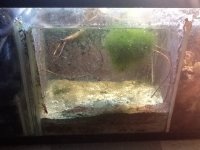I don't see the point of either but a shallow bed of either is better IMO, but still not necessary. A deep bed of mud or sand will store a lot of nutrients. Of course you'll grow macros like crazy

. Many will argue that a DSB will have an anaerobic area that will aid in denitrification. IME this is true for a short time until the sandbed stores wastes, and then has the complete opposite effect.
There are also pics online of nice tanks that advocate mud because it replenishes 'trace mineral'. I never saw a lab analysis to back up such a claim, and I could show you a load of nice/nicer reefs that don't use mud.
IMO the benefit of either mud or sanded is added surface area for nitryifing bacteria. This aids in system stability greatly. It's no accident that many of the nicest reefs out there are LARGE. I suspect that the more bacteria in a system, the faster the nitrogen conversion happens, and less contact corals and fish have with harmful ammonia+nitrite (this is speculation though)
Anyway, sorry to carry on

. I would just keep some clean pieces of live rock and cheato in the fuge.






